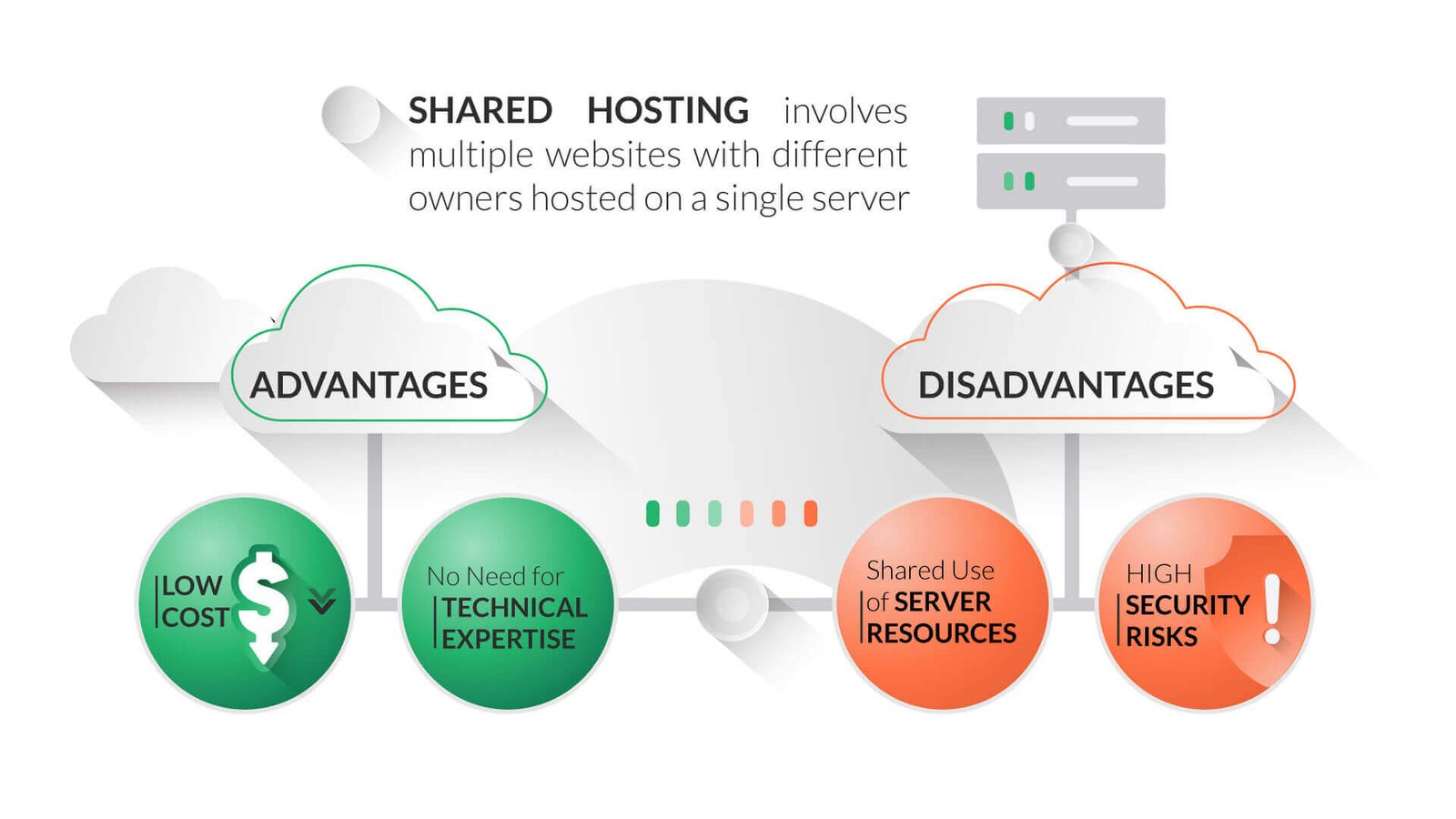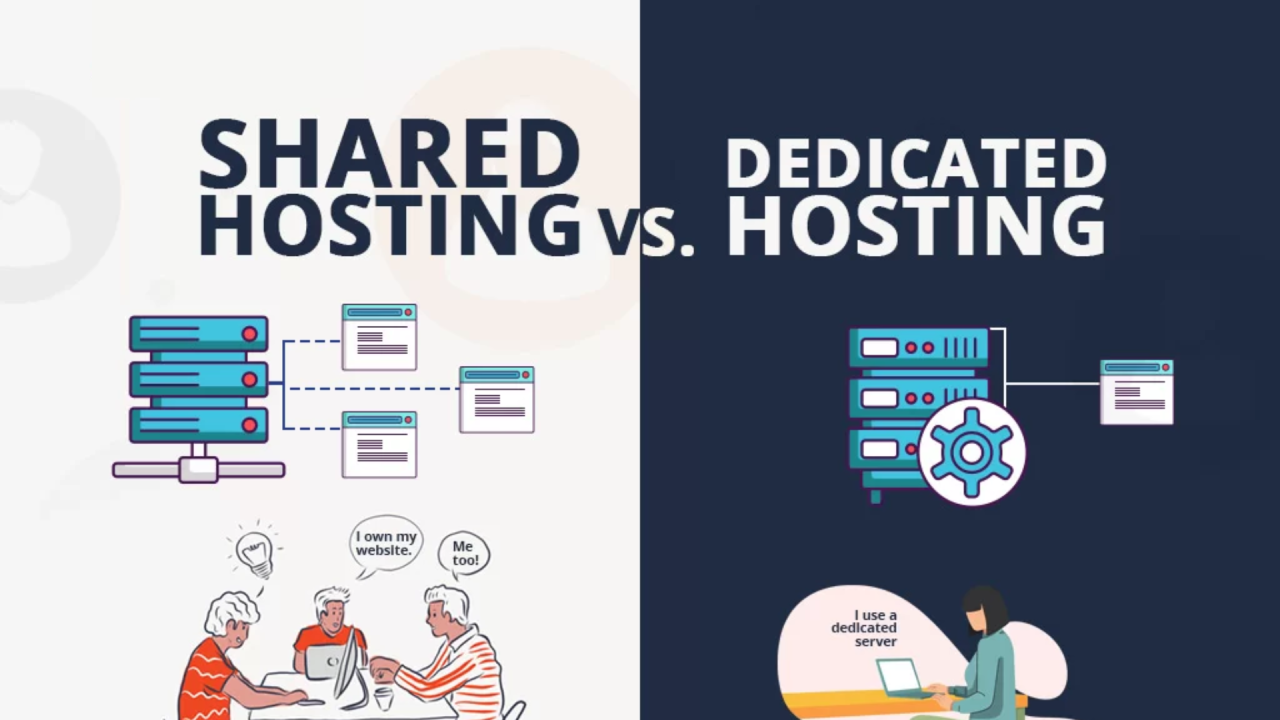Shared Hosting vs. Dedicated Hosting
When choosing a hosting plan for your website, one of the most important decisions you’ll make is whether to go for shared hosting or dedicated hosting. Both types of hosting offer distinct advantages and limitations depending on your website’s size, traffic, and performance needs. In this guide, we’ll explore the key differences between shared hosting and dedicated hosting, helping you choose the right one for your website.
What is Shared Hosting?
Shared hosting is a type of web hosting where your website shares server resources with multiple other websites. This means that your website’s data is stored on a server along with others, and the resources (such as memory, processing power, and bandwidth) are distributed among all the sites on that server. It’s a cost-effective option for individuals and small businesses who are just getting started.
How it works:
- The server’s resources are divided among all hosted websites.
- The hosting provider manages the server and maintenance, and the website owner typically only needs to focus on content.
- Shared hosting plans are often inexpensive, starting at just a few dollars per month.
Best for:
- Personal websites, blogs, or small business sites with low to moderate traffic.
What is Dedicated Hosting?
Dedicated hosting means your website gets its own dedicated server, entirely separated from other websites. You don’t share any of the server’s resources with anyone else, which means you have full control over the server’s configuration, performance, and storage. Dedicated hosting offers maximum performance, but it comes at a higher price compared to shared hosting.

How it works:
- You get the entire server’s resources exclusively for your website.
- You have full control over the server and can customize it to meet your specific needs.
- Hosting providers often offer management services, but you can also opt for an unmanaged dedicated server for more flexibility.
Best for:
- Large, high-traffic websites, e-commerce platforms, or businesses with specific performance and security requirements.
Key Differences Between Shared Hosting and Dedicated Hosting
1. Resource Allocation
- Shared Hosting: You share the server’s resources (CPU, RAM, bandwidth, etc.) with other websites. This can lead to resource limitations if other sites on the server consume a lot of resources.
- Dedicated Hosting: You have the entire server’s resources at your disposal. Your website doesn’t need to compete for resources, ensuring optimal performance even during high traffic periods.
2. Performance and Speed
- Shared Hosting: Performance can fluctuate depending on the activity of other websites on the server. If another website experiences a traffic spike or runs resource-intensive processes, your site’s speed can slow down.
- Dedicated Hosting: Dedicated hosting offers consistent and high performance since your website is the only one using the server’s resources. There are no concerns about the impact of other websites’ traffic.
3. Cost
- Shared Hosting: It’s the most affordable hosting option, with plans starting as low as a few dollars per month. It’s ideal for individuals or small businesses with a limited budget.
- Dedicated Hosting: Dedicated hosting is significantly more expensive than shared hosting. Prices can range from $100 to $500+ per month, depending on the server specifications and management services.
4. Control and Customization
- Shared Hosting: You have limited control over the server settings. The hosting provider manages the server and its configuration, and you only have access to a control panel to manage your website’s content.
- Dedicated Hosting: You have full control over the server. You can configure the server to meet your needs, install custom software, and manage settings as required. Some hosting providers also offer managed services to assist with server management.
5. Security
- Shared Hosting: While shared hosting providers implement basic security measures, the server is shared by multiple websites, making it more vulnerable to security breaches. If another website on the same server gets hacked, it could potentially affect your website as well.
- Dedicated Hosting: Since you have the entire server to yourself, you can implement stronger security protocols, including firewalls, secure sockets layer (SSL) certificates, and custom security configurations. This makes dedicated hosting more secure, especially for sites handling sensitive data.
6. Scalability
- Shared Hosting: Shared hosting is not very scalable. If your website experiences rapid growth or a sudden surge in traffic, you may quickly outgrow your hosting plan. Upgrading often requires switching to a different type of hosting, such as VPS or dedicated hosting.
- Dedicated Hosting: Dedicated hosting is highly scalable. As your website grows, you can upgrade the server’s resources, such as increasing storage or RAM, to meet your changing needs.
7. Maintenance and Management
- Shared Hosting: The hosting provider manages most of the server maintenance tasks, including software updates, backups, and server monitoring. This makes it a low-maintenance option for beginners.
- Dedicated Hosting: With dedicated hosting, you may need to manage the server yourself, especially with an unmanaged plan. If you choose a managed dedicated hosting plan, the hosting provider will take care of server management, including updates, backups, and monitoring.
Which Hosting Is Right for You?
The decision between shared and dedicated hosting ultimately depends on the size of your website, your budget, and the level of control you need.
- Choose Shared Hosting if:
- You’re just starting out with a personal website, small business site, or blog.
- You have a limited budget and don’t expect high traffic.
- You don’t need full control over the server and prefer the hosting provider to handle maintenance.
- Choose Dedicated Hosting if:
- You run a large, high-traffic website or an online store that needs maximum performance.
- You require full control over the server to meet specific needs.
- You can afford the higher costs and need advanced security and customization.
Conclusion
Both shared hosting and dedicated hosting have their own unique advantages and limitations. Shared hosting is a cost-effective solution for small websites with modest traffic, while dedicated hosting offers unparalleled performance, security, and control for larger, high-traffic websites. Understanding your website’s needs, traffic expectations, and budget will help you choose the right hosting plan for your online success.



